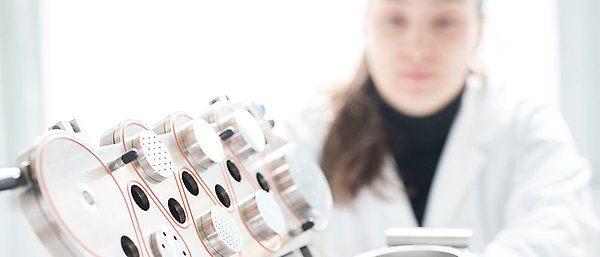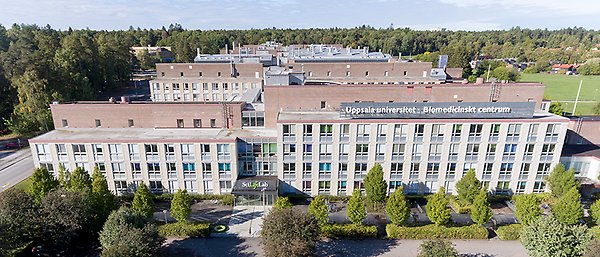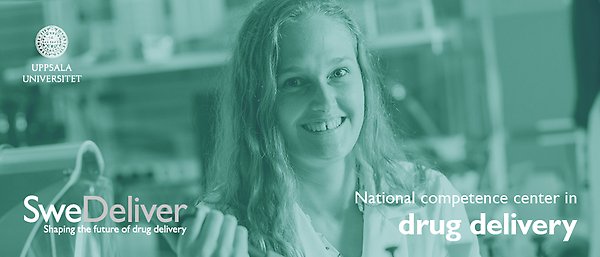The Faculty of Pharmacy. Part of something great.
Uppsala University is Sweden’s first university, founded already in 1477. Today we are a modern, broad and dynamic research university with a clear threefold: to conduct first-class research, provide education of the highest quality and interact with society to contribute to changing the world for the better. Being consistently ranked among the top 100 universities in the world confirms that we are doing a solid job.

Life sciences certainly are among our university’s scientific strongholds. At our Faculty of Pharmacy – Sweden’s only, founded in 1968 – we conduct research and education with both breadth and excellence. In 2024, we climbed to 24th place in the world in Pharmacy & Pharmacology Sciences on the QS World University Ranking. This is a recognition that makes us proud but certainly not satisfied. Here we present a selection of our ongoing activities. Welcome to us.
The Faculty of Pharmacy Magazine 2024
At Sweden's only Faculty of Pharmacy, we conduct research in all phases of pharmacy and train the pharmaceutical experts of the future.
Together, we are paving the way for better care and a healthier world. Read more about our activities in the Faculty of Pharmacy Magazine 2024.
Facilities
Uppsala Biomedical Centre, BMC, is the home of the Faculty of Pharmacy and one of Northern Europe’s largest research centers in pharmacy, medicine, biomedicine and chemistry. In top-equipped premises we conduct world-leading basic research focusing on the development and use of pharmaceuticals. At BMC we also provide education at undergraduate level, each year we conduct courses for 1,000 full time students, as well as extensive postgraduate education.

Current collaborations (by selection)
We conduct a significant share of our work in collaboration with the wider community. Our partners are close, at Uppsala University’s Faculty of Medicine and the University Hospital, but also far beyond regional and national borders. Our
employees also hold key assignments in a diversity of interdisciplinary consortia, uniting leading research environments and companies from around the world.
Our faculty’s technological infrastructure and accumulated competence constitute attractive resources in international pharmacy. We provide active support for research in both industry and academia. Our faculty also enjoys a unique collaboration agreement with Testa Center, a test bed and innovation environment at Cytiva’s site in Uppsala, providing our researchers and students free access to the centre’s industrial laboratories.
European infrastructure for translational medicine (EATRIS)
EATRIS is a European infrastructure for the development of medical therapies and tools. With the Swedish node at our Faculty of Pharmacy, we have direct access to an effective link between industry and academia, as well as a unique network with partners in both Europe and the world.
ENABLE-2
ENABLE-2 is an antibacterial drug discovery platform with hub at the Department of Medicinal Chemistry and focus on the early stages of antibiotic discovery and development. With funding from the Swedish Research Council, the National Research Programme on Antibiotic Resistance and Vinnova, we support the development of direct acting systemic antibacterial compounds, ensuring that there is a complete global development pipeline for new antibiotics.
European Accelerator of Tuberculosis Regime (ERA4TB)
ERA4TB is a European knowledge consortium working to develop develop ten new antibiotic candidates and new combination treatments against tuberculosis, an infectious disease that each year causes 1.5 million deaths. The initiative, initiated by IMI AMR Accelerator and running 2020–2026, includes Uppsala University's research environment in Pharmacokinetics and Quantitative Pharmacology, led by Professor Ulrika Simonsson.
SweDeliver
SweDeliver is a national competence centre with focus on drug delivery. With the academic hub at our Faculty of Pharmacy research and industry combine in a cross-sectoral environment where a successful research program is conducted at three technology platforms.

SweDeliver contributes to the development of drugs, better pharmaceutical treatments, continued investments in and supply of future competence to Swedish Life Science
UNITE4TB
UNITE4TB unites universities and research-based pharmaceutical companies in thirteen countries in the development of clinical trials of potential antibiotics and new treatments against tuberculosis. The consortium is funded by the IMI AMR Accelerator and operates on four continents. Formulation of mathematical models to design optimal clinical studies and to calculate the outcome of these is carried out at Uppsala University's research environment in Pharmacokinetics and Quantitative Pharmacology, led by Professor Ulrika Simonsson.
Our research environments
Department of Pharmaceutical Biosciences
Our mission is to lead in research that benefits the development of effective and safe pharmaceuticals. We aim to increase the knowledge about the uptake, kinetics, metabolism, effects and side-effects of pharmaceutical drugs. The research is performed in a number of research groups.
Cooperation with society is of great importance to us, and our research is often conducted in close collaboration with national and international laboratories or pharmaceutical companies. All PhD students are working within the research groups.
Learn more about our ongoing research
Biological research on drug dependence
Drug Safety & Toxicology
Neuropharmacology, addiction and behaviour
Pharmaceutical Bioinformatics
Pharmaceutical cellbiology
Pharmaceutical Physics
Pharmaceutical Technology
Pharmacognosy
Pharmacology
Spatial Mass Spectrometry
Translational Drug Discovery and Development
Department of Pharmacy
Our Department centers its research on three areas: Drug Delivery, Rational Drug Usage and Pharmaceutical Materials Science. The research is developed by a series of research groups, some of international prominence. The research groups represent a unique cluster of academic competences in Sweden and Department of Pharmacy has thus a key role in the development of the pharmacy discipline in Sweden. For an overview of the profiles of the research groups, go to the respective research group.
Learn more about our ongoing research
Department of Medicinal Chemistry
At the Department of Medicinal Chemistry, six research groups work to develop substances into novel drugs and treatments, often in collaboration with academia and industry in Uppsala, Sweden and beyond the nation's borders. Our scientific achievements provide us with a stable basis for regrowth, strategic recruitments and bringing our successful tradition into an exciting future. In parallel, we conduct education in an environment characterised by inspiring teachers firmly established in frontline research and knowledge.
Learn more about our ongoing research
.jpg)
Successful history. Prosperous future.
Uppsala University's tradition of pharmaceutical activities dates back to the middle of the 17th century, but has in recent decades experienced enormous development. The field's growing health and socio-economic significance has added the aspect of social science. At Uppsala University, the Faculty of Pharmacy and Faculty of Medicine work in close collaboration within the Disciplinary Domain of Medicine and Pharmacy.
Important years in the development of our faculty:
1968 | Farmaceutiska Institutet is integrated into Uppsala University as the Faculty of Pharmacy. |
|---|---|
1973 | Adjunct professors are established with employment in industry and service at the university, thus forming a bridge between academia and business. |
1975 | All of the faculty's departments are on site in Uppsala's Biomedicine Center. |
1976 | The National Board of Health and Welfare's pharmaceutical department (from 1990 the Swedish Medical Products Agency) moves its operations to Uppsala and becomes a neighbor of the Faculty of Pharmacy. |
1977 | The faculty appoints Arvid Carlsson, pharmacologist and later Nobel laureate, as honorary doctor. |
1990 | The faculty takes an active part in the formation of the ULLA consortium, the purpose of which is to strengthen European research and postgraduate education in the field of pharmaceuticals. |
1992 | The faculty reorganizes and eleven departments become three. |
1994 | The Wallenberg Foundation and Astra allocate SEK 30 million to the faculty's doctoral programs in Galenic pharmacy. |
1999 | Uppsala University's faculties of pharmacy and medicine unite in the Disciplinary Domain of Medicine and Pharmacy. |
2001 | Thomas Lönngren, a faculty alumni graduated in Uppsala in 1976, is appointed head of the European Medicines Agency. |
2006 | Anders Hallberg, Professor of Medicinal chemistry, is appointed Vice-Chancellor of Uppsala University. |
2018 | The Faculty of Pharmacy celebrates 50 years at Uppsala University. |
2020 | SweDeliver, the national competence center with a focus on drug delivery is inaugurated with the Faculty of Pharmacy being the academic hub. |
